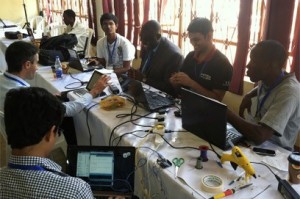Hacking Medicine: Doctor, Meet Entrepreneur
-
-
slice.mit.edu
Filed Under
Recommended
In September, executives and senior leaders from Pfizer, Novartis, and other leading drug companies gathered on campus with MIT students for the first pharmaceutical hackathon.

Together, students and industry leaders hashed out better ways to design and undertake clinical trials of medicine while improving the data generated during trials.
It’s not surprising that a drug company would look to the world’s top engineering school to improve its products or business. It just tends not to happen in a single weekend.
But that’s a Hacking Medicine hackathon, a fast-paced weekend event that brings as many as 150 MIT engineers and MIT Sloan business students into close, kinetic contact with clinicians and health care administrators. The approach is problem-based pitching—not “Here’s our idea. Buy it,” but “Here’s our problem. Solve it.” Medical professionals detail industry challenges. Working with student entrepreneurs and engineers, they develop innovative solutions to those problems.
In just two years, these hackathons have spawned more than a dozen companies tackling a diverse set of problems in health care. One company, PillPack, is a pharmacy that fills, sorts, and delivers medications in packaging that simplifies taking medication. Another, Podimetrics, is developing an insole that collects and transmits data in an effort to prevent complications in diabetics. And a third, Smart Scheduling, uses machine learning to help doctors and clinics schedule patients and predict no-shows, saving time and money. All three companies were developed in a matter of hours.
Hacking Medicine—sometimes stylized H@cking Medicine—formed at MIT Sloan in 2011 with the goal of bringing MIT's business and engineering prowess to the health care industry, which has developed a reputation for being slow to innovate, adopt new technology, or change.
“These are MIT and HST [Harvard-MIT Health Sciences and Technology] students who believe that a broken health care system can be fixed by entrepreneurship, especially by engineers who can think about systems and technologies to scale medicine,” said Zen Chu, co-founder and faculty director of Hacking Medicine, entrepreneur in residence at the Martin Trust Center for MIT Entrepreneurship, and the founder of three companies.
Chu estimates that more than 1,000 engineers and physicians have attend the eight MIT hackathons to date, including a September one in Boston, one in Madrid, and two partnered with Massachusetts General Hospital in India and Uganda. Hacking Medicine organizers estimate that of the hundreds of ideas pitched, more than 140 teams have formed. While it’s early, and many teams are still in a nascent stage, more than a dozen companies have formed so far.
Read the full blog post with startup descriptions and learn about the Oct. 18-20 Hacking Pediatrics event with Boston Children’s Hospital.






